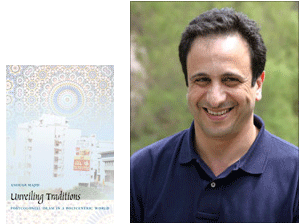
Anouar Majid
Unveiling Traditions
By Anouar Majid
Manufactured cultural biases and antagonisms deflect people’s attention from the more pressing issues facing humanity as a whole and energize the real powers undermining world cultures and ‘imagined communities.’ Although power relations and configurations have shifted dramatically in the last few decades, the languages of politics and scholarship still operate on dated assumptions whose effect is to freeze live histories into immutable and misleading stereotypes. One can understand how people without sufficient access to academic scholarship continue to believe that nations and cultures as they imagine them are real; but how does one account for the persistence of such beliefs in whole fields of academic study, despite a continuous barrage of information telling us that the world is being dramatically reconfigured by the rising powers of multinational organizations and extraterritorial bodies and laws? Will apologists for the West ever be able to separate commercially packaged cultural products from the Western heritage they seek to defend? Can Muslims realistically go back to an unmodified Golden Age of Islam, even if one accepts that such an age ever existed? If the answer to the last two questions is difficult, if not impossible, what, then, are the options?
I have tried to argue that a solution to the actual impasse is the rereading of the past and the present within the new global realities engendered by capitalism, and the imagining of a post-Eurocentric, postcapitalist world in which cultures live in constant progressive dialogue with one another. I suppose that the disincentives for such an undertaking are powerful, not least because of the tendency of dominant institutions to dismiss such alternatives as utopian or subversive; yet one cannot ignore the dysfunctions of capitalism without basically resigning oneself to some impending global nightmare. Since the real world is structured along economic imperatives that relegate most Islamic countries to the periphery or to the neocolonial status shared by most poor or technologically marginal countries, cultural disputes that don’t take the global situation into account appear as gestures of empty nostalgia or expressions of false consciousness. Nativism, whether it takes on the polished look of academic sophistication, crude racist statements, or xenophobic legislation, expresses a sense of displacement that is real; however, the widespread feeling of alienation that fuels such attitudes is not caused by cultural or ethnic differences but by the relentless penetration of capital into every sphere of human life…
More broadly, this book tries to challenge secular academics to include the world’s nonsecular expressions as equally worthy of consideration and valid alternatives, and Muslim scholars to rethink their attachments to texts and canons that have obscured the egalitarian and viable legacies of Islam.
Excerpt from Anouar Majid, Unveiling Traditions: Postcolonial Islam in a Polycentric World (Durham: Duke University Press, 2000, pp. 138-139, 153). Dr. Majid is Chair and Professor of English and Language Studies at the University of New England.